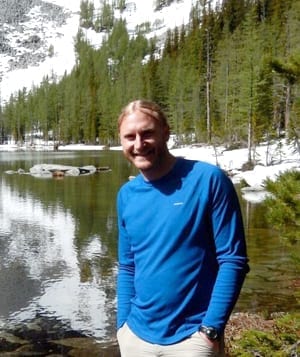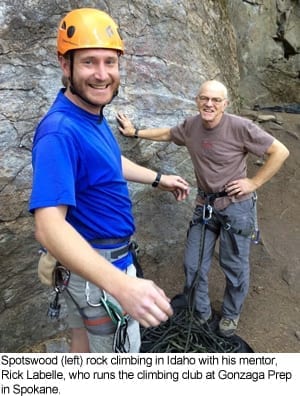Daniel Spotswood, SJ, began climbing while teaching at Gonzaga Preparatory School in Spokane, Washington, during his Jesuit formation.
By Becky Sindelar
February 22, 2016 — Born and raised in Mobile, Alabama, Daniel Spotswood, SJ, grew up far from the mountains — elevation 10 feet. But his Jesuit vocation would lead him west where he discovered a passion for rock climbing. And later, while in South America for theology studies, he started mountain climbing, eventually going as high as 20,000 feet in the Andes.
So how does this Jesuit’s unusual hobby fit into his vocation? Surprisingly, Spotswood, who says he is not an “adrenaline junkie,” has found that his climbing has close connections to both his academic interest in anthropology and his prayer life.
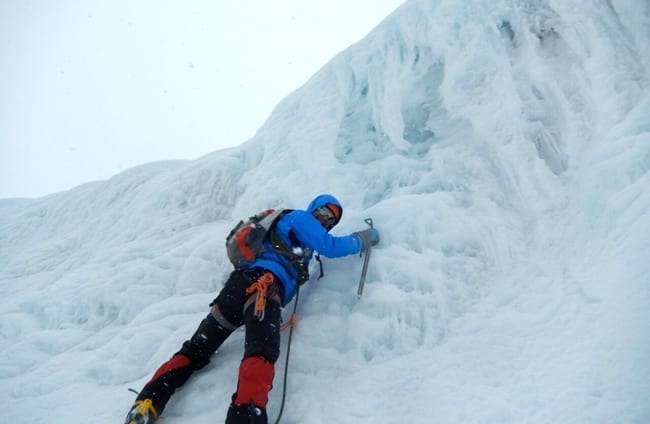
Spotswood climbing vertical ice on Pan de Azúcar in Colombia.
Growing up, Spotswood attended Catholic schools but wasn’t familiar with the Jesuits until he arrived at Spring Hill College in Mobile. There, he was attracted to the Society of Jesus’ mission and studied philosophy, theology and interreligious dialogue, graduating with a degree in interdisciplinary humanities in 2005.

Spotswood (first row, second from left) professed First Vows in the Society of Jesus in 2008; this summer he will be ordained to the priesthood.
Feeling a call to the Society, Spotswood joined the Jesuit Volunteer Corps for a year to further discern his vocation. His work on the Colville Reservation in Washington State with Native Americans continued to spur his interest in interreligious and intercultural dialogue as well as solidify his calling to the Jesuits. While on the reservation, he also began to hike and explore the Cascades in his free time.
He joined the Society of Jesus’ Oregon Province because of their work with Native Americans, and after two years in the novitiate and philosophy studies in Toronto, he headed back to Washington State for regency to teach at Gonzaga Preparatory School in Spokane. The school had a rock climbing club, and Spotswood asked if he could join. The moderator, Rick Labelle, was happy to have a Jesuit on board; he also ended up becoming Spotswood’s climbing mentor.
“I really got into rock climbing there — I love the feeling of climbing and the challenge of it, and it was also a great way to connect with students,” says Spotswood.
For theology studies, he went to the Pontificia Universidad Javeriana in Colombia, which gave him access to the Andes and the chance to do high-altitude climbing for the first time. “It was a big step to be going up to 17,000 feet or so in elevation, where oxygen is really low.”
When Spotswood asked his local superior about climbing a mountain in Colombia, his superior was hesitant — but not because of the dangers of the sport. “That area of Colombia had a strong presence of guerilla groups and was dangerous politically in the past — he didn’t want me to get kidnapped!” But Spotswood was able to show him the area had changed and now attracted climbers from all over the world.
As far as the dangers of climbing itself? Spotswood says it’s not an extreme sport. “I don’t see climbing as like jumping out of a plane. It’s much more calm and contemplative, but at the same time there is an element of risk taking. I like the term ‘controlled risk.’ You take risks, but when you’re in over your head, you have to know when to come back and call it quits.”

Spotswood with Colombian friends just below the summit of Pan de Azúcar (16,896 ft.) in Colombia.
In addition to seeing places he might not otherwise have gone, climbing also gave Spotswood the chance to meet people in his new environment. “You get a different sense of the country and politics and culture from the people you meet on the trips. That’s something I love about climbing. You develop strong friendships with other climbers.”
He also traveled to Ecuador and Peru, where he climbed even taller mountains — 20,000 feet is currently the highest he’s climbed. While in Quito, Ecuador, Spotswood had the opportunity to meet a fellow Jesuit climber, Father Jose Ribas, who put climbing on the map in Ecuador. Fr. Ribas started a climbing club at the Jesuit high school in Quito, which trained some of the first serious technical climbers in Ecuador in the 1950s. It proved so popular that students wanted to keep climbing with the club after graduation, and it evolved to include alumni and is now one of the most prestigious climbing clubs in the country.
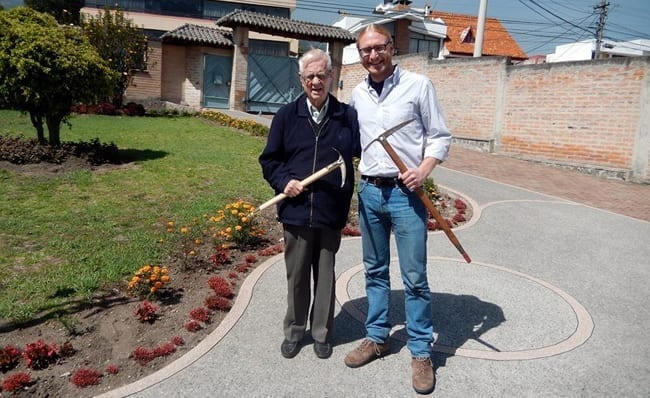
Spotswood with Fr. Jose Ribas, SJ, holding his prized ice ax.
“He’s famous in Ecuador because he’s also responsible for building the hostel at the base of Cotopaxi volcano, which serves thousands of climbers a year,” Spotswood explains. “It’s a starting point for people who sleep in the hut and then climb the mountain.”
Fr. Ribas regaled Spotswood with tales of climbing Mt. Blanc in the Alps with a wooden-shafted ice ax — which are no longer used, and Spotswood even got a photo with Fr. Ribas and his prized ax. Spotswood says he hopes to come across more Jesuits who climb or might be interested in learning. If there is one downside to climbing as a Jesuit, it’s that “it does take me out of the Jesuit community and it’s a little isolating. It would be great to find other Jesuits who do this.”
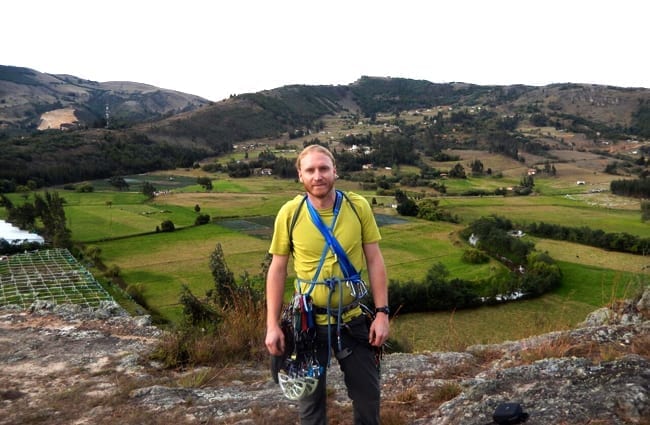
Spotswood on top of a traditional rock climbing rock in Suesca, Colombia.
His mountaineering also has a connection to his anthropology studies, where he’s studying perceptions of the natural environment. “How we see glaciers, how we see mountains. I see that as a significant thing, and as climate change is a big concern in the world, how are our perceptions of climate change formed?”
Last May as he was writing his master’s thesis in theology, Spotswood had the chance to go on a pilgrimage to observe how climate change is affecting the rituals of indigenous people. “Traditionally, religious leaders of the pilgrimage go up to a glacier just above the main sanctuary where thousands of pilgrims are gathered, and they spend the night up on the glacier and take ice from it and bring it back down to the community and the ice would have spiritual, medicinal value to them.”
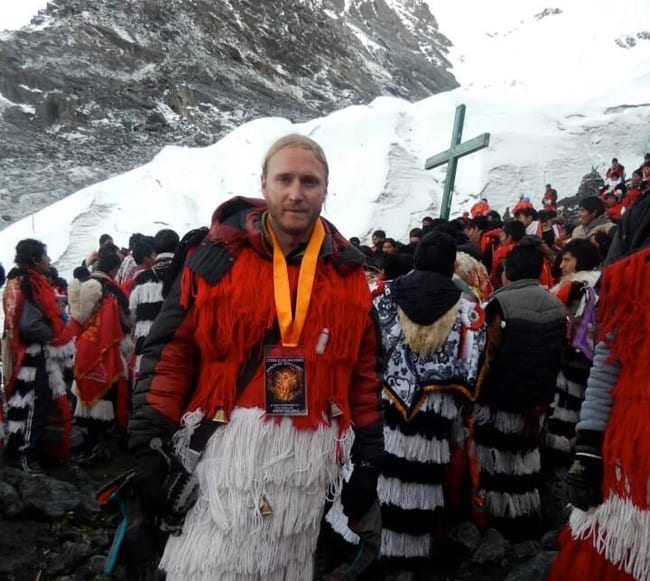
The morning after Spotswood spent the night on a glacier at 17,000 ft. during the Qoyllurit’i pilgrimage in Peru.
But now with the glacier visibly disappearing every year, people have stopped taking ice from it. “I got really interested in that: what does it mean for a community when a ritual changes?”
He recently finished his theology studies, but he’ll continue to study these kinds of questions and climb when he heads to Scotland in a few months to study social anthropology at the University of Edinburgh. While there, Spotswood hopes to make it to the Alps, and in the future, he plans to get back to the Andes in Peru, where he hopes to continue his research, using mountaineering to help him to connect with indigenous cultures and hear local stories.
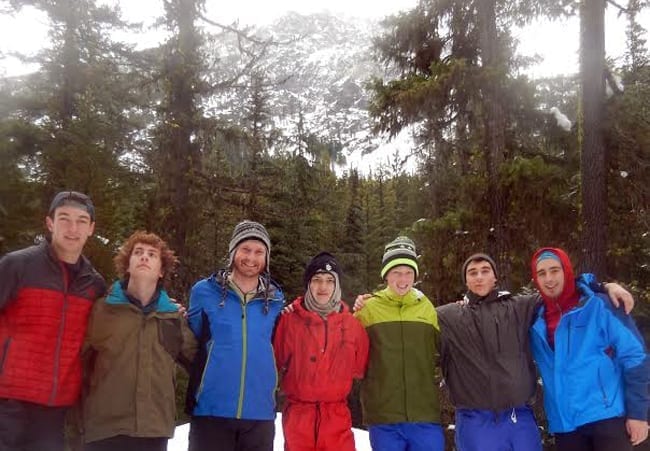
Spotswood reunited with the Gonzaga Prep climbing club this month. The group attempted to climb Cannon Mountain (in the background) but had to turn around due to a storm.
“I like that balancing act in climbing, walking on that line of what’s too much and when to be humble and back off,” he says. “I see that related to my Jesuit vocation and what our role in the church is, being on the frontier and being bold and knowing how much to push it.”
Spotswood also enjoys the contemplative aspect of the climb. “I like the focus that it requires. All of a sudden your attention is completely in that moment and all that matters is getting to the next hold. I see that as helpful in my prayer life in trying to stay attentive to God. Climbing is an expression of that, a way of prayer for me.”
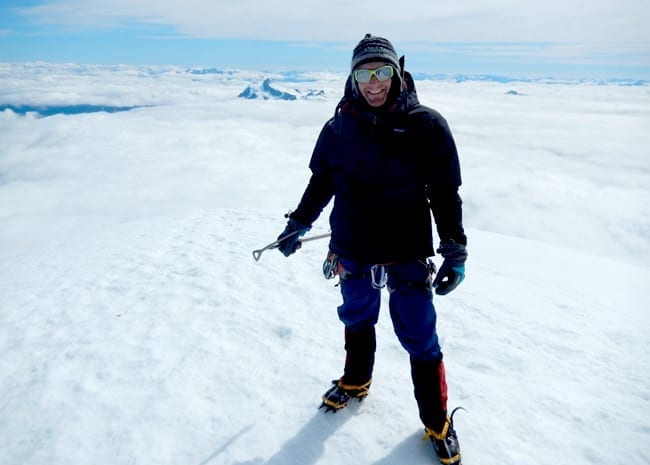
Spotswood on the summit of Mount Baker in Washington.
Do you want to learn more about vocations to the Society of Jesus? Visit www.jesuitvocations.org for more information.

